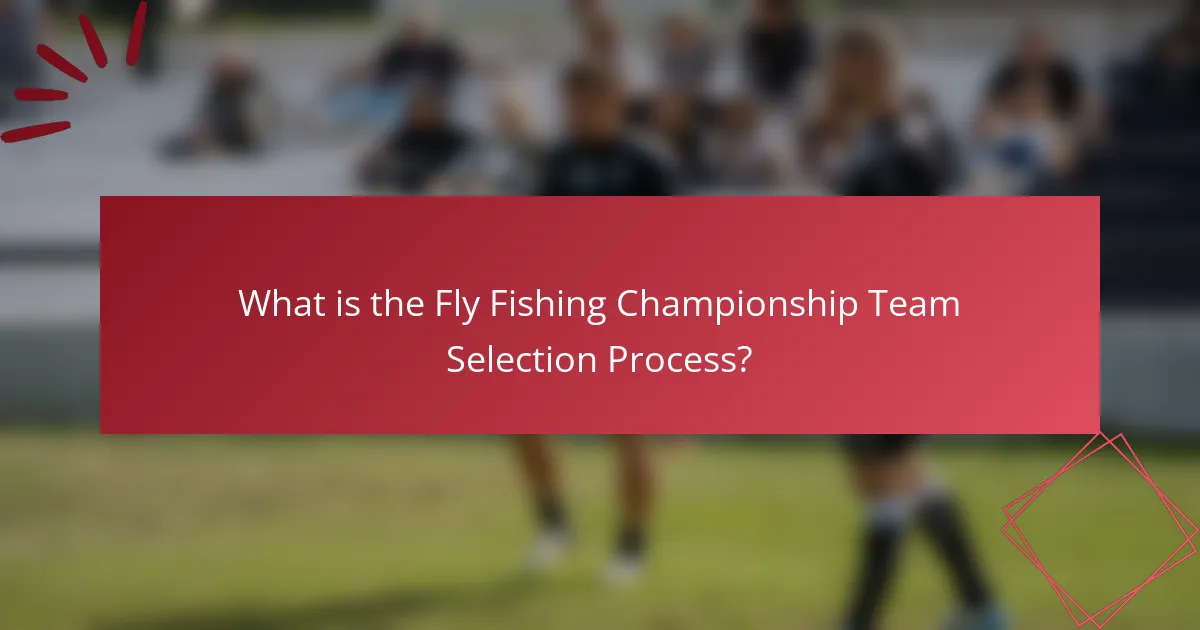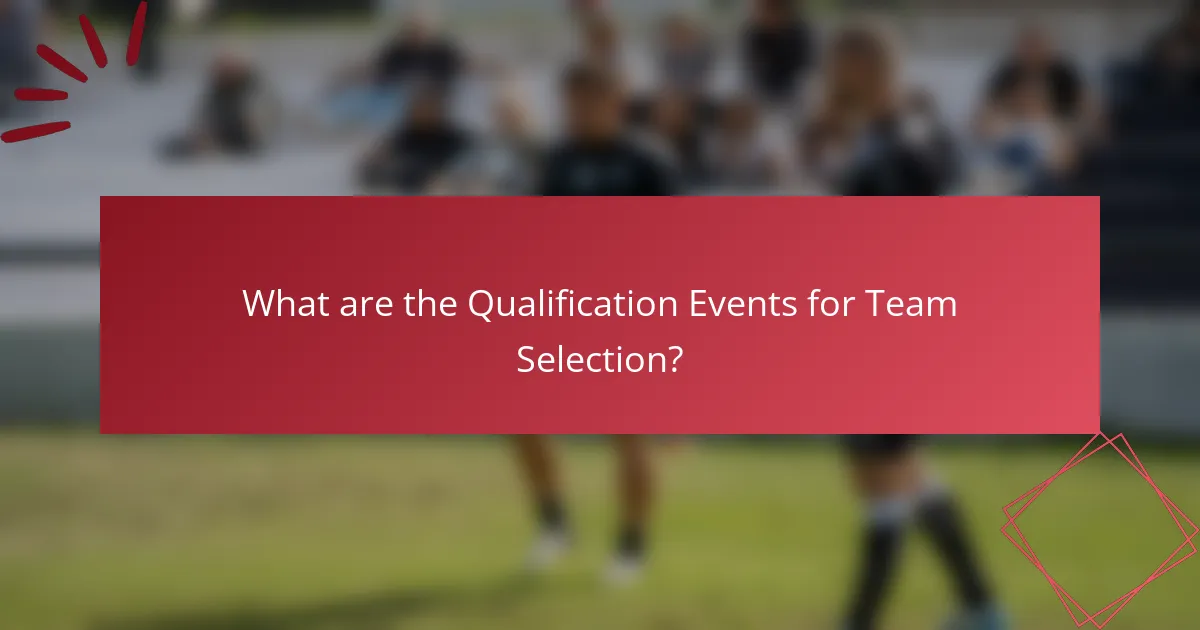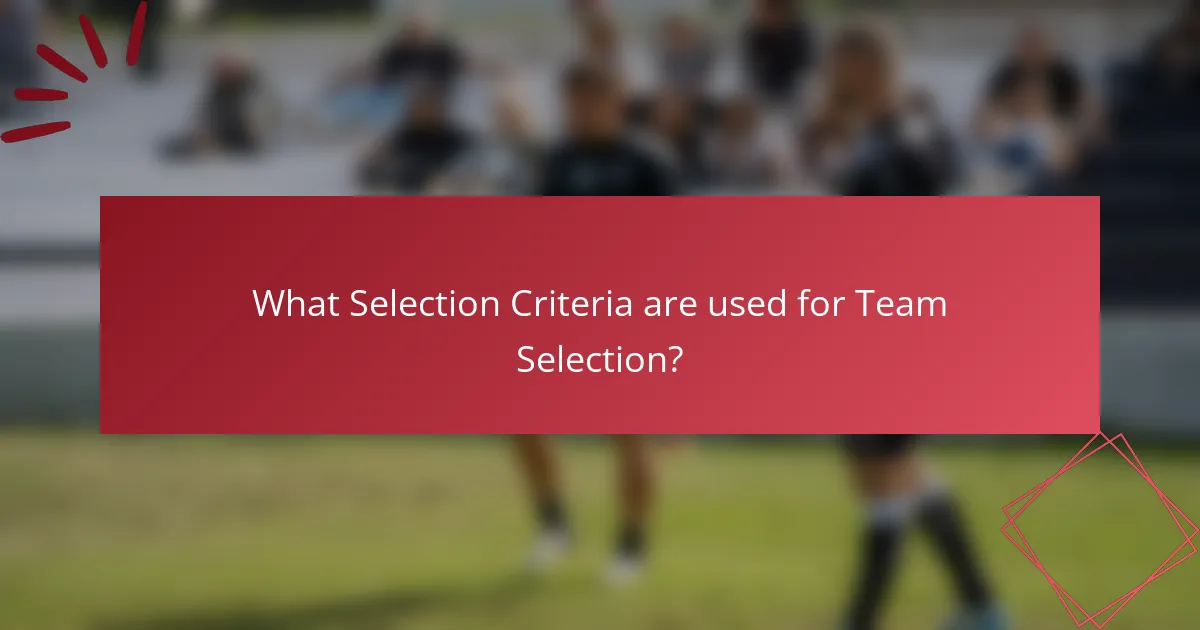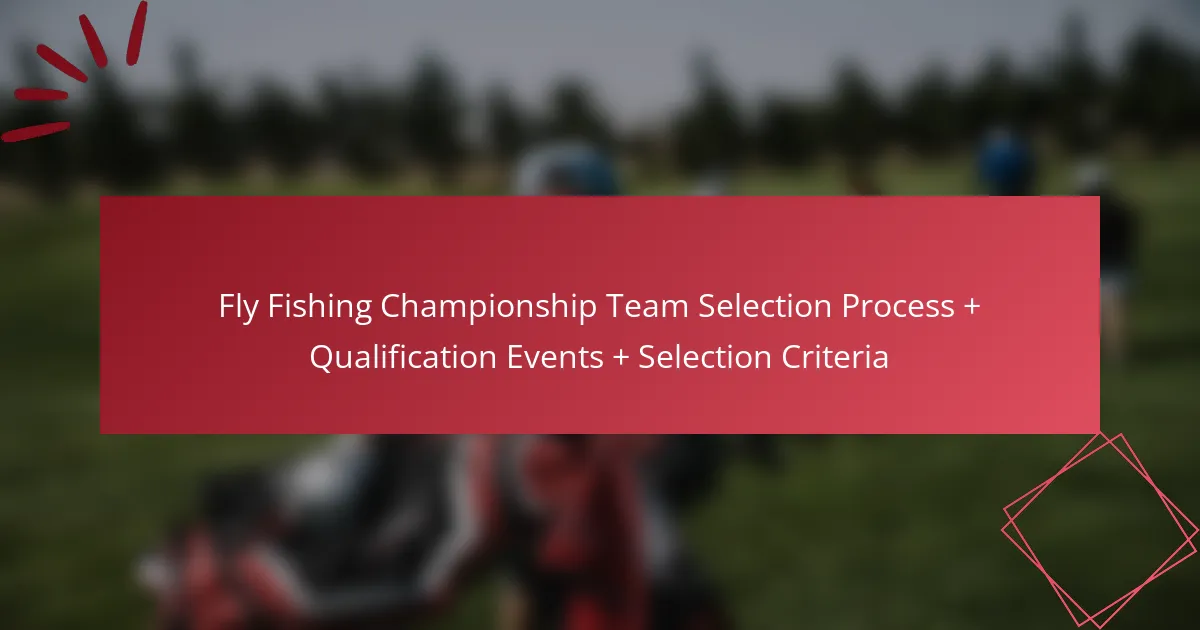The Fly Fishing Championship Team Selection Process is a structured method for identifying skilled anglers to represent their teams at national and international levels. This process includes qualification events such as regional tournaments and national qualifiers, where candidates are assessed based on their fly fishing skills, technique, consistency, and adaptability. Performance metrics from these events determine eligibility for team selection, with specific placement or point thresholds required to qualify. The selection criteria also consider the angler’s experience level and results in qualification events, ensuring that only the most proficient individuals are chosen to compete. This comprehensive approach guarantees a high standard of representation in fly fishing championships.

What is the Fly Fishing Championship Team Selection Process?
The Fly Fishing Championship Team Selection Process involves multiple stages. First, candidates must participate in qualification events. These events assess their skills and performance in fly fishing. The selection criteria include factors like technique, consistency, and adaptability. Performance metrics are recorded during these events. The top performers are then evaluated for team selection. The final team is chosen based on cumulative results from the qualification events. This structured approach ensures that only the most skilled anglers represent the team.
How is the selection process structured?
The selection process for the Fly Fishing Championship Team is structured in multiple stages. Initially, candidates must participate in qualification events. These events assess the skills and performance of each participant. Scoring criteria are established to evaluate their results consistently.
Following the qualification events, a panel reviews the scores and ranks the participants. The highest-ranking individuals are then selected for the team. This method ensures that only the most skilled anglers are chosen. Additionally, selection criteria may include past performance and experience in competitive fishing.
Overall, the structured approach aims to identify the best talent for representing the team in championships.
What stages are involved in the selection process?
The stages involved in the selection process for the Fly Fishing Championship Team include several key phases. First, there is an initial application stage where interested candidates submit their applications. Next, candidates participate in qualification events to demonstrate their skills and performance. Following this, a review stage occurs, where scores and results from the qualification events are analyzed. Subsequently, a selection committee evaluates the candidates based on predefined criteria. Finally, the selected team members are announced and notified of their selection. Each stage is critical to ensure that the most qualified individuals represent the team.
Who are the key stakeholders in the selection process?
The key stakeholders in the selection process are the selection committee, coaches, athletes, and governing bodies. The selection committee evaluates candidates based on established criteria. Coaches provide insights on athlete performance and readiness. Athletes are directly affected by the selection outcomes. Governing bodies set rules and regulations for the selection process. These stakeholders collaborate to ensure a fair and transparent selection. Their roles are essential for maintaining integrity in the championship team selection.
Why is the selection process important for fly fishing championships?
The selection process is crucial for fly fishing championships because it determines the most skilled participants. This process ensures that only qualified anglers represent their teams. It evaluates their performance in various qualification events. The selection criteria assess techniques, strategy, and adaptability in different fishing environments. A rigorous selection process enhances the overall competition quality. It promotes fairness by providing equal opportunities for all participants. Ultimately, it contributes to the integrity and prestige of the championship.
What impact does the selection process have on team performance?
The selection process significantly influences team performance by determining the skills and compatibility of team members. A well-structured selection process ensures that individuals possess the necessary expertise in fly fishing techniques. It also assesses teamwork abilities, which are crucial for collaborative success during competitions.
Research indicates that teams formed through rigorous selection tend to achieve higher performance levels. For example, a study by Hackman and Oldham (1976) found that well-selected teams demonstrate increased effectiveness and satisfaction. Furthermore, the selection process can enhance team dynamics, fostering better communication and cooperation among members.
In competitive scenarios, teams with carefully chosen participants often outperform those with randomly selected members. This correlation highlights the importance of strategic selection criteria in achieving optimal team performance.
How does it influence the overall competition?
The fly fishing championship team selection process influences overall competition by establishing a standardized method for identifying top anglers. This process ensures that only the most skilled participants qualify for the championship. Qualification events serve as a preliminary assessment, allowing competitors to demonstrate their abilities under consistent conditions. Additionally, selection criteria promote fairness and transparency, creating a competitive environment based on merit. The implementation of these criteria can lead to higher performance standards across the board. As a result, the overall quality of competition improves, benefiting both participants and spectators.

What are the Qualification Events for Team Selection?
Qualification events for team selection in fly fishing championships typically include regional tournaments and national qualifiers. These events assess anglers’ skills and techniques in various fishing conditions. Performance in these events determines eligibility for the national team. Anglers must achieve specific placement or point thresholds to qualify. Each governing body may have its own set of events and criteria. For instance, the International Game Fish Association often outlines these events in their regulations. Participation in recognized tournaments is essential for qualification. These events ensure that only the most skilled anglers represent their teams.
What types of events qualify participants for selection?
Events that qualify participants for selection include regional fly fishing tournaments and national championships. These events are structured to assess angling skills and techniques. Participants must demonstrate proficiency in casting, presentation, and fish handling. Additionally, competitive events often have specific rules and scoring systems. Successful performance in these events is typically a prerequisite for selection. For example, top finishers in regional tournaments are often considered for national team spots. The selection process aims to identify the most skilled anglers for championship representation.
How do different events vary in their qualification criteria?
Different events have distinct qualification criteria based on specific requirements. For example, regional qualifiers may require participants to have prior competition experience. National championships often set higher standards, such as minimum catch weights or specific techniques. Some events may also consider age or skill level, while others might focus on team dynamics. Each event’s criteria reflect its competitive nature and objectives. The variation ensures that participants compete against others of similar ability. This structure promotes fairness and enhances the overall quality of the competition.
What are the locations and formats of these events?
The locations of the fly fishing championship qualification events include various rivers, lakes, and coastal areas known for their fishing opportunities. These events are typically held in regions that provide suitable habitats for target fish species. Formats of these events often involve competitive fishing sessions where teams or individuals aim to catch the highest number of fish within a set time. Some events may also use a catch-and-release format to promote conservation. Locations are selected based on accessibility and the quality of fishing. Events are organized by fishing federations or clubs to ensure adherence to regulations.
Why are qualification events critical in the selection process?
Qualification events are critical in the selection process because they objectively assess participants’ skills and abilities. These events provide a standardized platform for competitors to demonstrate their proficiency in fly fishing. They ensure that only the most capable individuals are chosen for the team. Qualification events also help to foster a competitive environment that encourages improvement. Additionally, they serve to identify potential team members who can perform under pressure. This structured approach enhances fairness and transparency in the selection process. Historical data shows that teams selected through qualification events consistently perform better in competitions. Therefore, qualification events are essential for ensuring the success of the fly fishing team.
How do they ensure fairness and competitiveness?
They ensure fairness and competitiveness through standardized selection criteria. The criteria are consistently applied across all qualification events. This includes equal weight given to performance metrics, such as catch rates and technique evaluation. Additionally, judges are trained to maintain objectivity during assessments. Transparency is prioritized by publishing results and selection processes. Regular reviews of the criteria help adapt to emerging trends in fly fishing. This structured approach minimizes bias and promotes a level playing field for all participants.
What role do they play in skill assessment?
They serve as evaluators of angling proficiency. In the context of fly fishing championships, skill assessments determine an individual’s ability to perform essential techniques. These assessments include casting accuracy, line control, and fish handling. Competitors are scored based on their performance in these areas. High scores indicate a strong skill set, while lower scores highlight areas for improvement. This structured evaluation informs the selection committee about each applicant’s readiness for competition. Ultimately, skill assessments ensure that only the most qualified anglers represent the team.

What Selection Criteria are used for Team Selection?
Selection criteria for team selection in fly fishing championships typically include angling skills, experience level, and performance in qualification events. Angling skills assess a competitor’s ability to catch fish effectively. Experience level evaluates the number of years and types of fishing a candidate has participated in. Performance in qualification events measures results in specific competitions leading up to the championship. These criteria ensure that selected team members possess the necessary skills and experience to compete at a high level.
What attributes are evaluated in the selection criteria?
The attributes evaluated in the selection criteria for the Fly Fishing Championship Team include angling skill, teamwork, and adaptability. Angling skill assesses the participant’s ability to catch fish effectively. Teamwork evaluates how well participants collaborate with teammates during events. Adaptability measures how quickly participants adjust to changing conditions. These attributes ensure that selected team members can perform under various circumstances.
How is performance measured during qualification events?
Performance during qualification events is measured through a combination of scoring systems and objective metrics. Scoring typically includes the total number of fish caught, their sizes, and the time taken to catch them. Each of these factors contributes to an overall performance score. Additionally, judges may evaluate techniques, strategy, and adherence to competition rules. This multi-faceted approach ensures a comprehensive assessment of an angler’s abilities. Data from past events indicates that these metrics effectively differentiate skill levels among participants. For example, in the 2022 Fly Fishing World Championships, performance metrics were crucial in selecting the top teams based on their cumulative scores.
What specific skills are prioritized in the selection process?
The specific skills prioritized in the selection process for a fly fishing championship team include casting accuracy, technique proficiency, and fish identification. Casting accuracy ensures that participants can place their flies precisely where needed. Technique proficiency encompasses various methods such as roll casting and double hauling. Fish identification skills are crucial for recognizing species and understanding their behavior. These skills are essential for success in competitive fly fishing. The selection committee evaluates candidates based on these criteria to ensure they meet the championship standards.
How do unique attributes affect individual selection?
Unique attributes significantly influence individual selection in the fly fishing championship team process. These attributes can include specific skills, past performance, and adaptability to different fishing environments. For instance, a candidate with exceptional casting skills may be prioritized over others. Additionally, unique attributes such as experience in competitive settings can enhance a candidate’s appeal.
Selection committees often evaluate these unique traits through qualification events. Historical data shows that candidates with proven success in similar competitions are more likely to be selected. Thus, unique attributes serve as critical differentiators in the selection process, shaping the final team composition.
What rare skills might give a competitor an edge?
Rare skills that might give a competitor an edge in fly fishing include advanced casting techniques and exceptional knot tying abilities. Mastering double haul casting allows for greater line control and distance. This skill can significantly improve casting accuracy in varying conditions. Exceptional knot tying ensures secure connections between line and flies. This reliability can prevent lost fish during competitions. Additionally, knowledge of entomology aids in selecting the right flies based on local insect hatches. Competitors with these rare skills often outperform others in high-pressure situations.
How are unique achievements recognized in the selection process?
Unique achievements are recognized in the selection process through specific criteria that highlight individual accomplishments. These criteria often include tournament wins, placement in prestigious events, or notable contributions to the sport. Selection committees evaluate these achievements alongside traditional performance metrics. This ensures that candidates with exceptional records are duly acknowledged. Recognition may also involve scoring systems that assign points for unique accomplishments. Such a system emphasizes both individual skill and competitive success. Additionally, unique achievements can influence team dynamics and overall team selection. This multi-faceted approach ensures a comprehensive evaluation of all candidates.
What tips can improve chances of selection for aspiring competitors?
Aspiring competitors can improve their chances of selection by focusing on skill development, networking, and understanding the selection criteria. Regular practice enhances casting techniques and fish-catching strategies. Joining local fly fishing clubs fosters connections with experienced anglers. Networking can lead to mentorship opportunities and insider knowledge. Researching the specific selection criteria is crucial for aligning skills with expectations. Attending qualification events provides firsthand experience and exposure to the competitive environment. Engaging with coaches or seasoned competitors offers valuable feedback for improvement. Keeping a detailed fishing log can help track progress and identify areas for growth.
The Fly Fishing Championship Team Selection Process is a structured method designed to identify and select the most skilled anglers for competitive representation. The process includes multiple stages, starting with qualification events that assess participants’ skills, performance metrics, and adaptability. Key stakeholders, including a selection committee and coaches, evaluate candidates based on established criteria, ensuring fairness and transparency. The article will also cover the types of qualification events, specific selection criteria, and tips for aspiring competitors to enhance their chances of selection. Overall, the selection process plays a crucial role in determining team performance and maintaining high competition standards.
